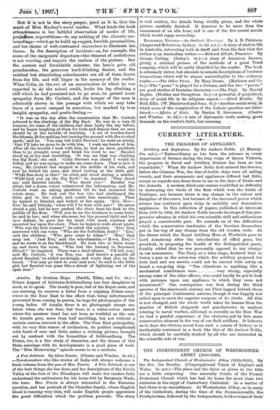CURE,ENT LITERA.THR
THE PROGRESS OF ARTILLERY.
Artillery and Explosives. By Sir Andrew Noble. (I. Murray. 21s. net.)—" Extraordinary as has been the advance in every department of Science during the long reign of Queen Victoria. the progress in Naval and Artillery Science has been no less remarkable." When Sir Andrew Noble first entered the Service, before the Crimean War, the line-of-battle ships were all sailing vessels, and their armaments and appliances differed but little, except as regards size, from those in use in the days of Drake and the Armada. A modern third-rate cruiser would find no difficulty in destroying the whole of the fleet which won the battle of Trafalgar, not because there is 'any change in the valour and discipline of the crews, but because of the increased power which science has conferred upon ships in mobility and destructive appliances. In this collection of papers, published at intervals from 1858 to 1900, Sir Andrew Noble 'records the steps of this pro- gressive advance, in which his own scientific skill and enthusiasm played a considerable part. He reminds us of the difficulties which the conservative tendencies of the Services themselves put in the way of any change from the old wooden walls. At the dinner which the Royal Artillery Mess at Woolwich gave to Lord Armstrong after the introduction of rifled guns, the president, in proposing the health of the distinguished guest, frankly added that he was personally opposed to any change' in our armaments. The Navy, at a later stage, declared that so heavy a gun as the seven-ton which the artillery proposed for both land and sea service could not be carried with safety on board a sea-going ship. "The objections to anything like a mechanical contrivance were very strong, especially among some of the older officers, who could hardly be got to look with patience upon any appliance to which they were not, accustomed." One consequence was that during the third. quarter of the nineteenth century our Fleet lagged behind those of the principal Continental nations, though it was happily not called upon to meet the superior weapons of its rivals. All this is now changed, and the whole world takes its lessons from the practice of British shipyards and gun-factories in matters relating to naval warfare, although so recently as the Boer War we had a painful experience of the obstacles put by this same conservative element in the way of our field artillery. It behoves us to draw the obvious moral from such a course of history as is incidentally contained in a book like this of Sir Andrew Noble, which should be carefully studied by all who are interested in the scientific side of war.






































 Previous page
Previous page